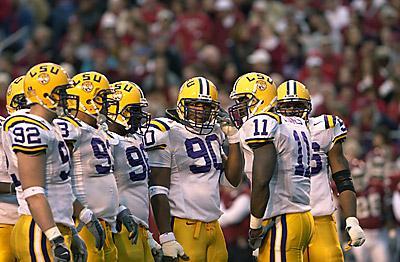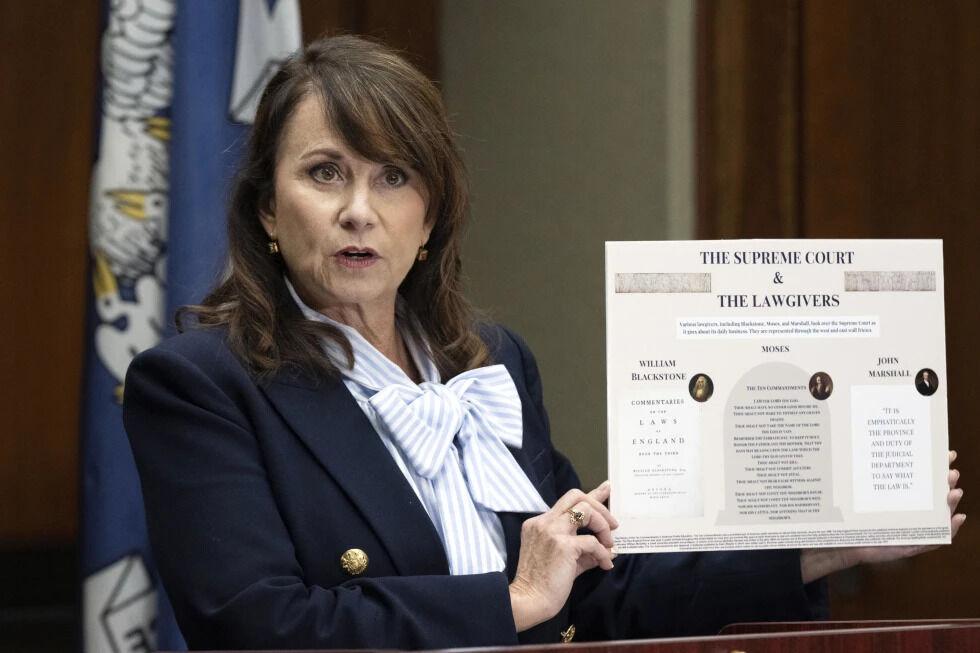A touchdown in Tiger Stadium or a winning shot at the buzzer may bring thousands of fans to their feet, but an athlete reading a book to an elementary student or participating in a campus activity often goes unnoticed.
LSU athletes plunge into a leadership role the moment they step onto the field, court or track for the first time. These normal students automatically become role models, heroes and even icons for many.
Students may often wonder if these “heroes” really are worthy of the praise and admiration they frequently receive, and whether they actually are living up to their roles as leaders at the University.
“I think they get away with too much. That’s not a good example for everyone else,” said Sara Morrison, a chemical engineering sophomore.
Other students think athletes are setting an excellent example for hard work and dedication.
“They’ve got to manage going to practice, doing their schoolwork, traveling and all sorts of things,” said Jonathan Jarreau, a business management senior.
Rob Aucoin, a chemical engineering junior, said the large number of fans who attend football and basketball games shows people look up to athletes as role models.
Certain teams and several individual athletes widely are recognized as campus leaders. Senior football players Bradie James and LaBrandon Toefield, senior basketball players Ronald Dupree and Collis Temple III and the soccer team often are cited as the strongest leaders.
“Collis Temple graduated and then went to grad school,” Aucoin pointed out. “He’s doing exactly what every athlete should do. And, Bradie came back another year. That’s huge, just to fulfill a promise to his parents. That’s amazing.”
While campus and community involvement outside of their respective sport is not required of athletes, coaches often encourage their players to be well-rounded individuals.
“I don’t want to say I require my athletes to be involved in the community, but I encourage them,” said George Fotopoulos, head soccer coach. “It’s mandatory, but I don’t have to sit there with a whip. My kids enjoy doing it.”
Fotopoulos said the soccer team won a community service award last year for its work with the elderly, after-school reading programs and children’s soccer clinics. He believes his players are setting a high standard for LSU athletes as leaders and community servants.
LSU coaches recognize their athletes are held to a high standard in the campus community.
“If you’re an athlete here at LSU and something goes great, everybody knows, and if it’s bad, everybody knows,” said Sue Gunter, head women’s basketball coach.
Gunter acknowledged junior Tameka Johnson, senior Kisha James, senior Ke-Ke Tardy and senior Patty Hanten as her team’s strongest leaders on and off the court.
Other University athletic teams also expect a certain level of involvement.
“We like for our players to be involved in other things because we represent this institution,” said head football coach Nick Saban. “I tell them that they all have an obligation and a responsibility to represent in a first-class manner. So, to be involved in other things would definitely be a positive for us.”
While Saban admitted to a lack of overall team involvement in campus activities, he said football players are leaders in other ways.
“I know we do a whole lot of community stuff,” Saban said. “They go see kids in the hospitals. We’ve got guys involved in the literacy program, where you go read to kids in schools. I don’t know what we’ve ever been asked to do on campus. Anything we’ve ever been asked to do, though, we’ve tried to do.”
Saban knows without hesitation James is the strongest leader on his team.
While the senior linebacker is well-known for dominating the defensive line, fellow students and teammates also recognize his importance off the field.
“I’m a member of the Omega Psi Phi fraternity,” James said. “I do things to help people around campus. I’m not in any other campus organizations, but I do a lot of service.”
James is enthusiastic about his personal campus involvement and also encourages his teammates to get involved in additional activities.
Saban, James, Fotopoulos and many students pointed to Temple as the most outstanding campus leader among all LSU athletes.
Temple is known as a leader on the court, scoring points in the double-digits almost every game; in the classroom, as a three-time SEC academic honor roll recipient; and on campus, holding leadership positions, such as president of the student athlete advisory board and president of TAF Collegiate Club.
In addition to his accomplishments on the court and in the campus community, Temple has managed to earn his bachelor’s degree in three years and will receive his master’s degree in sports management later this month.
“Leadership is not something you can push on somebody,” Temple said. “It has to be granted to them by their teammates, or it has to be something that just evolves and happens on its own. You can’t just say ‘OK, you’re the leader.’ It doesn’t work like that.”
Dupree also recognizes the responsibility of being an athlete.
“We’re thought of even as idols sometimes when we’re wearing that LSU jersey,” Dupree said. “We have a standard to live up to, as far as handling ourselves socially and in public and also on the court.”
While James, Temple and Dupree have managed to go above and beyond by participating in activities outside their respective sports, the demanding schedules athletes have often prevent them from being involved in other activities.
And, contrary to the high standards the community holds LSU athletes to, one of the biggest complaints among University community members often is athletes’ arrogance. While this may be a concern for some individual athletes, Saban is confident this is not a reason to worry about an entire team.
“One of the things I try to stress to the players is that just because you’re a football player doesn’t mean that you don’t have to do what’s right,” Saban said. “When it comes to how you treat other people, whether it is the lady in the cafeteria or whoever it is, why should you think that because God gave you a gift of being a good athlete that means you don’t have to do what everybody else is supposed to do?” he said.
Overall, most LSU athletes are doing an efficient job of being leaders at the University. A select few seem to have adopted the largest leadership roles.
“I know athletes have very demanding schedules,” said Micah Cating, an education senior. “But, I see several of them getting involved outside of their sports. Maybe some athletes should follow the example of their leaders.”
While athletes often struggle to find time in between intense practices and class schedules, some may need to imitate Temple, James, Dupree and other leaders and step into campus leadership roles.
“People are watching [athletes] all the time,” Temple said. “When you can be watched and still get along, do the right thing and be seen in a positive light, for the most part — that’s when you’re being a leader outside of your sport.”
University athletes step up to the plate as community leaders
By Laura Patz and Amanda McElfresh, Staff Writer and Contributing Writer
December 4, 2002

JESSICA WALDON / The Reveille
LEADER OF THE PACK
LEADER OF THE PACK
University athletes step up to the plate as community leaders
More to Discover







